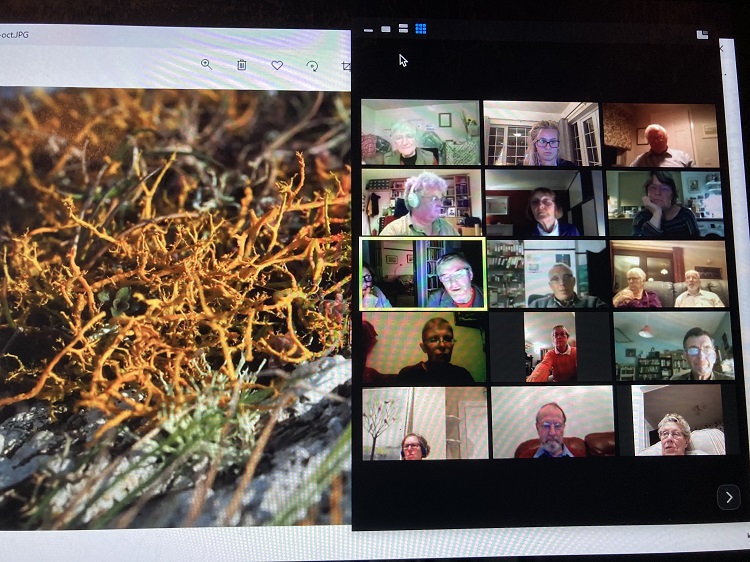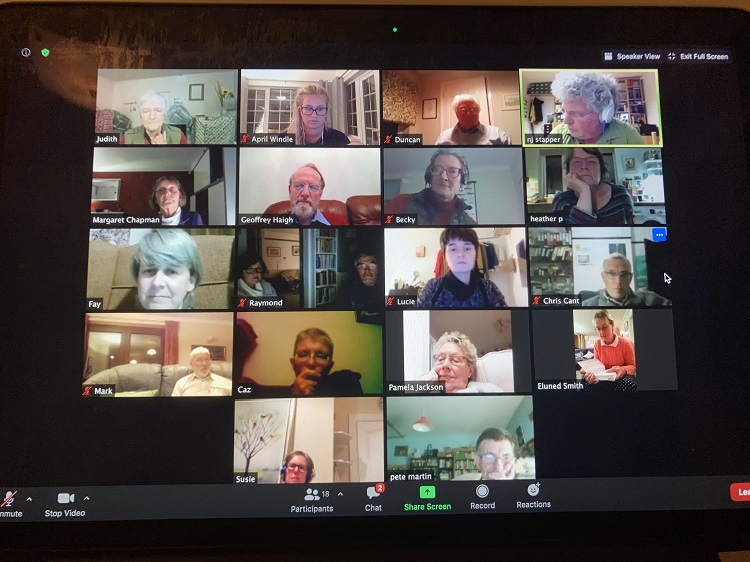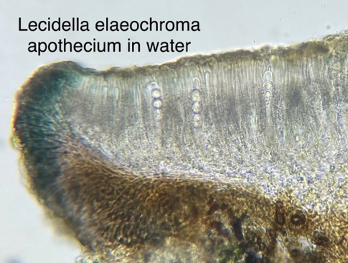BLS Zoom Groups
1. Lichen Chat and Improvement Groups - LCIGs (here)
2 Lichens for Absolute Beginners - LABS (lower down this page) or see (New Page)
3a. Post-LABS groups (lower down this page) 3b. Lichens-Next Steps (lower down this page)
4. Microscopy Groups (lower down this page) - Basics and Improvers
5. "Learn the language" (lower down this page), 6. Latest News (lower down this page), and 7. Some History (lower down this page)

-------------
Latest News:
Judith Allinson writes: (last edited on 26 Jan 2026)
1. The LCIG groups, See Details, dates. Tue 27 Jan: Guest talk on Aquatic Lichens.
2. LABs groups:-"Lichens for Absolute Beginners" The two new groups which started in January are now full. Bookings are now being taken for the next groups starting in October 2026. Details.
3. Lichen Next Steps - The new intermediate lichen group: meets monthly on Tuesday evenings - See Section 3b
4. Post-LABs Groups The situation is much more flexible: If you have attended a LABs group in the past and are not already in a Post-LABs group and wish to join one, there may be opportunity to join an existing Post-LABs group.
4. Microscopy Groups: Some sessions will be running this autumn Details
1. Regular LCIG groups: - open to all.
Lichen Chat and Improvement Groups (LCIG) are Zoom groups for people of all levels of lichen knowledge (but especially intermediate) to meet. There is a Tuesday evening group (7pm) and a Wednesday morning group (10am). The groups meet fortnightly in Winter and monthly in Summer. New people are welcome, whether you are a beginner or very experienced. We started in October 2020, eight months into the UK Covid Lockdown, We are now starting our sixth year. New people have been joining all the time. (See list of dates near the end)
If you are interested in joining in one of these groups, or have questions, or would like to have a private practice session learning how to use Zoom before the meeting, please contact zoom-improvement@britishlichensociety.org.uk
The sessions are run for members of the society but we very much welcome non-members in the hope that you might join someday soon.
As an example a 2 hour meeting might include:
1. Chat, or breakout groups for chat;
2. Three people give short 2-10 minute presentations, each followed by a period of 5 to 10 minutes discussion.
3. Five minute coffee break
4. Opportunity for announcements
5. People show pictures of lichens they would like to ask advice about.
6. Discussion.
Since Autumn 2022 we have replaced two of the "Three 2-10 minute presentations" by a guest speaker who will give an "introductory talk on their more specialist topic lasting 25 minutes" followed of course by questions and group participation.
The topics of some of the Past Talks are listed here in the History Section of this page

The meetings are a serendipity but it amazes me what interesting things we learn because such different people attend, including several BLS members from abroad. The computer screen is an excellent way of showing and examining details of lichens. I hope that every participant will deliver at least one presentation, (even if just a short 2 minute slide show about one lichen outside their back door or on their apple tree).
---------------------------------
We welcome offers and suggestions for speakers
---------------------------------
Meeting dates in 2026
|
2. LABs groups - Lichens for Absolute Beginners
Are you an absolute beginner as far as lichens go? Or maybe you have been on an introductory lichen course somewhere but have forgotten parts of it. (See this page on the BLS website which lists the skills people might expect to develop at beginner and intermediate levels.) Or you might be attending the general Zoom Lichen Chat and Improvement Groups (LCIG, see above) but would value some more basic practice.
LABs groups:-"Lichens for Absolute Beginners" are are series of Lichen Zoom Sessions - tutorials - led by a volunteer member of the society - who may be an intermediate but is keen to help people learn. By working in groups of 4 to 9 people there is opportunity to share pictures, to interpret them and to practice using technical terms. All the participants gain by meeting each other. The course may be between 8 and 16 sessions of 1-1.5hr each. Most groups meet fortnightly but some meet weekly.
If you are interested in attending such a LABs group as well as, or instead of, the LCIG group, please email
zoom-improvement@britishlichensociety.org.uk .
Ten LABs groups ran, or are still being run Oct 2025- Sept 2026. You are also very welcome to put your name down for the ones starting in October 2026. Details
Meanwhile you might like to consider working through the free BLS "Learn the language" online self guided course on this website, or attend the "to pay for" four sessions of the Field Studies Council Online course Discovering Lichens with Petra Vergunst
Read more about other Zoom groups organised by members of the BLS.
Beginners are very welcome at the regular LCIG groups.
3a. Post-LABs groups
As in 1 January 2025, there are five Post-LABs groups running. Three of the 2020-2022 LABs groups are still running as Post-LABS groups. (called "LNABS", "ILG", "ABLE" (Lichens Not for Absolute Beginners, Interesting Lichens Group and ? respectively) and a fourth morphed into a local physical group with field meetings "LISS" - Lichens in South-east Scotland. This is because individuals from within the LABs groups were prepared to take on the organising of their own groups. Another group is being run by Mary Steer as a continuation of a 2024 LABs group and another by Fay Newbery as a continuation of her 2024 group.
3b. Lichen Next Steps - A new intermediate lichen group
The group is monthly(ish) at 7pm on Tuesdays . The next meetings in 2026 are 17th Feb, 17th March, 14th April, 12th May. The group is for anyone who's been looking at lichens for a while and is familiar with the basics of lichen ID (ie early intermediate or intermediate intermediate), and wants to move on to the next level. It an informal self-learning support forum where there will be a few more experienced lichenologists who can offer advice. It's not a tutorial but there might be the occasional talk. Participants will be expected to come prepared with a short presentation on something they've been working on. They might have got stuck and want some help or perhaps have successfully reached an ID - both will be interesting for others to see. Tues evening monthly, starting at 7pm, as before, and lasting up to a couple of hours, depending on need. Next meeting: 9th Dec then 6th Jan.
The Skills and Knowledge for Lichenologists page on the BLS website might be useful if you're unsure what level you are - or come along and find out.
If you'd like to join the group or have any questions (including asking for the Zoom link) email Caz on cazwalker3@gmail.com
4. Microscopy Groups:
Basics and Improver lichen microscopy Zoom peer support drop-in groups have been meeting online since 2022. See ‘Events’ for current dates.
4a. Basics Lichen Microscopy peer support
Zoom meetings are monthly, usually on Monday evenings. Open to recent beginners who already have their own microscopes: both a low-power dissecting microscope and a high-power compound microscope. You may have already been on a ‘live’ microscopy course and would like to gain confidence with your new skills.
The group offers an opportunity to share what you have been doing, to find some support with cutting and interpreting sections and to ask questions.
4b. Improvers Lichen Microscopy peer support
Zoom meetings are monthly, usually on Monday evenings. The Improvers group is a drop-in group open to anyone moderately confident with the basics. Bring along a photo to share, or a short presentation on your latest lichen microscopy exploits.
If someone would like to run other sessions, maybe in a different format, that would be very welcome.
If you might be interested in either group, please contact: zoom-microscopy@britishlichensociety.org.uk to be added to a mailing list, or for further information.
Useful links about lichen microscopy on the BLS website
Sectioning: some ideas that might help by John Skinner
Advice on Microscope sections, staining, ascus tips and chemicals by Mark Powell.
5. Learn the Language course
Beginners are also recommended to consider the "Learn the Language" short online course of the BLS. This can be carried out independently
or with the help of a volunteer BLS tutor by phone or by zoom.
------------------------------------------------------
6. Some History of the Groups:
This section is historical. It show how the groups started, gives credit to people who ran some of the previous LABS groups and then lists a rather random selection of some of the topics covered in the LCIG groups to give you a flavour of the meetings. We hold between 16 and 26 Pairs of LCIG meetings a year.
We started in October 2020, eight months into the Covid Lockdown (which had started in March 2020 in UK) and new people have been joining ever since. We held 26 pairs of meeting 2020-2021, 20 pairs of meetings 2021-2022 and 18 pairs of meetings 2022-Sept 2023 18 pairs of meetings Sep 2023-Sep 2024 and 18 pairs of meetings Sep 2024-Sep 2025.
The names of the people who ran the LABS groups 2020- 2025 are as follows:
2020 - Autumn Dec: 1. Mark Stephens & Sue Knight 2. Graham Pyatt, 3. Pete Martin,
2021 - Spring: .4. Bob Vaughan, 5. Geoffrey Cleave, 6. Mark Stevens & Sue Knight
2021 - Autumn: Nov: 7. Mark Stephens & Sue Knight; 8. Geoffrey Cleave
2022 - Spring: 9. Pete Martin; 10: Caz Walker
2022 - Autumn: October: 11. Mark Stephens & Sue Knight; 12. Sue Thomas
2023 - Spring 13. Bob Vaughan 14. Barbara Brown
2023 Autumn: October: 15: Mark Stephens & Sue Knight (Shropshire) 16. Fred Gibson (South West UK) 17. Sue Thomas (Scotland) 18. Barbara Brown
2024 Spring: January: 19: Anthony Speca 20: Fay Newbery
2024 Summer: June: 21: Fred Gibson
2024 Autumn: Current Groups : 22: Mark Stephens Mondays 7pm; 23: Sue Thomas Tuesday 6pm; 24: Pete Martin: Wed eve; 25: Fay Newbery (Wales): 26: Thurs eve; Sue and Raymond Griffiths (West Wales): Thursday 7pm. 27. Barbara Brown (Tue eve)
2025: January: 28: Wed Eve: Craig Postlethwaite; 29: Anthony Speca Thursday mornings; 30: Sylvia Davidson and Peter Bissett: Thursday evenings. Summer: 31: one group in June with Fred Gibson.
2025-2026 academic year: There were 10 groups with 77 participants who started, with only rare dropouts to date. (Jan 2026) .
2025: Autumn: 32 - 39: Eight groups: October: Susan Benbow, Peter Bisset, Barbara Brown, Sylvia Davidson,
Craig Postlethwaite, Sue Thomas, Mark Stephens and (in December) Monica Farrow.
2026: January 40,41: Fred Gibson and James Paton.
-----------
Examples of some earlier LCIG talks:
Autumn 2022:
Caz Walker: Peltigeras, part 1 and Part 2;
Rebecca Yahr: Intro (and overall view) of Cladonias
Alison Cutts: Intro to Drawing Lichens - and tips
Peter Crittenden: Nitrogen Fixation and Lichens
Heleen Plaisir: Working at Edinburgh Botanic Gardens.
Andy Cross: An introduction to historic maps to help understand lichen habitats.
Spring 2023:-
Members contributions. (incl QGIS, Usnea apothecia)
David Hill: Lichen dyes: history, science and practice
Pete Martin: Four black wine gums on trees: L.e., F.l., A.p., C.n.
Paulina Cifuentes Uribe: Lichens found in retreating glaciers
Graham Pyatt: Three coastal Caloplacas
Autumn 2023:
David Hill: "Sex" in Lichens
John Skinner: Physcia species part 1.
Caz Walker on Peltigeras - of mine spoil (and other more common ones) near Alston
Neil Sanderson: Cladonias with red apothecia.
Raymond Griffiths: Tarn Lichen - Protoparmeliopsis achariana.
Maxine Putman and John Fisher: Lichens in Sweden
Spring & Summer 2024:
Dennis Waters: Introduction to Chromatography
Maria - Jose Chesa: The genus Cetraria
Craig Postlethwaite: Paisley Natural History Society Lichen Walks
Oliver Moore:- My work (with Plantlife) as "Saving Scottish Rainforests Advisor";
Sylvia Davidson: Llimonaea sorediata + a few other lichens of north facing church walls.
Di Napier: Borrowing Specimens from the BLS Herbarium
Richard Brinklow: The BLS Herbarium
John Skinner: The genus Physcia
Bryan Edwards - Lichen Conservation George Creiff: Frullania and Fungi
Nicholas Carter:Lichens and Heritage Conservation at Blenheim Palace
Spring 2025 - fortnightly
14,15 Jan 2025 (15 Jan: talk by Becky Yahr on "Non-grey Parmelias")
28, 29 Jan (28 Jan: Talk by Isobel Clarke - How to Identify an Usnea)
11,12 Feb ( Talk by Janet Simkin on Filling in Spreadsheets and the BLS data)
25, 26 Feb (David Hill: Photobionts Part II)
Many people have given talks on "Two lichens from outside my house or my back garden"
We value the contributions of beginners.
 (
(